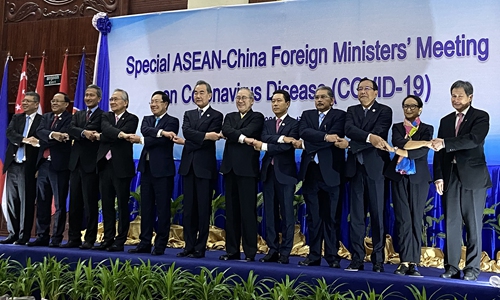
Chinese State Councilor and Foreign Minister Wang Yi (sixth from the left), foreign ministers from 10 ASEAN member states and ASEAN Secretary-General Lim Jock Hoi (right) join hands on stage at a foreign ministers' meeting between China and ASEAN on the COVID-19 in Vientiane, Laos, on February 20, 2020. Photo: AFP
Philippine President Rodrigo Duterte has banned the Philippine Navy from participating in joint maritime drills in the South China Sea, Department of National Defense Secretary Delfin Lorenzana said on Monday. The order has sent a clear message to Washington that Manila doesn't want to be dragged into a war with China by a crazy US.
Singapore is also worried about current China-US relations. Singapore Prime Minister Lee Hsien Loong said, in an Atlantic Council Front Page online event on July 28, that the most important objective for whoever wins the US presidency in November is to "stabilize your relations with China because for the rest of Asia we depend on stable US-China relations in order for us to have a secure, predictable environment in which we can make a living and live our lives."
As a matter of fact, with the Trump administration lifting the curtain of a new cold war with China, many small and medium-sized countries are concerned about where the international situation will head and also about their own destiny. Southeast Asia is one of the regions that is the most vulnerable to intense China-US competition, so countries in the region are particularly upset.
Southeast Asian countries over the past three decades have been dealing with China and the US based on the principle of flexibility and pragmatism. Many scholars use the term "hedging" to summarize Southeast Asian countries' China policies. On one hand, these countries hope to keep engagement with China economically and diplomatically so that they can benefit from China's economic development and integrate China into the existing regional order in which ASEAN has a dominant position. On the other hand, out of misgivings toward China caused by the unsolved territorial and maritime rights disputes and China's rapid rise, albeit peaceful, they seek security cooperation with the US as a long-term insurance.
However, what has made Southeast Asian countries more anxious is that it has become increasingly difficult for them to sustain the "hedging" strategy that has lasted for years. The core of the "hedging" strategy is to maintain the countries' vague strategic position. The ambiguity allows these countries to hedge between big powers in order to gain benefits from both sides. However, the aggressive Trump administration is urging "democracies" to establish an anti-China alliance. It wants to build a new Berlin wall dividing the world. For Southeast Asian countries, this means the room for their foreign policy will be gradually compressed.
In fact, as the international environment has changed, the "hedging" strategy has become increasingly outdated. Uncertainties brought by the end of the Cold War drove ASEAN members to adopt this course of action. These countries were worried that the end of the Cold War might lead the US to lose interest in the Southeast Asia. They hoped to ensure the US can stay and continue to provide a certain degree of protection to countries in the region through enhancing security cooperation with the US. Besides, in the eyes of the ASEAN members, China's rise is full of uncertainties. They have questions over whether China's economic growth is sustainable and whether China will rise in a peaceful way.
But now, the uncertainties that gave rise to the "hedging" strategy have vanished. Washington will not easily leave Southeast Asia. What Southeast Asian countries need to worry more about is whether or not Washington will be more likely to take military means to intervene in regional affairs.
At the same time, China's rise has become an indisputable fact and inevitable trend. As each other's largest trading partner, ASEAN and China have formed deep economic interdependence. China and ASEAN members have made progress in the South China Sea Code of Conduct negotiations. This indicates that China has both the will and the ability to resolve territorial disputes with relevant countries through peaceful means.
All these changes show that Southeast Asian countries need to reexamine their ambiguous diplomatic strategies. Politicians and scholars represented by Lee Hsien Loong have said countries in the region don't want to take sides. Such statements are not enough in front of the Trump administration's aggressiveness to launch a new cold war. Southeast Asian countries should do more to clearly and openly oppose the US' new cold war offensive toward China. This not only is critical to their own interests, but also matters to regional peace and development.
The author is an associate professor at the Institute of International Relations, China Foreign Affairs University. opinion@globaltimes.com.cn
